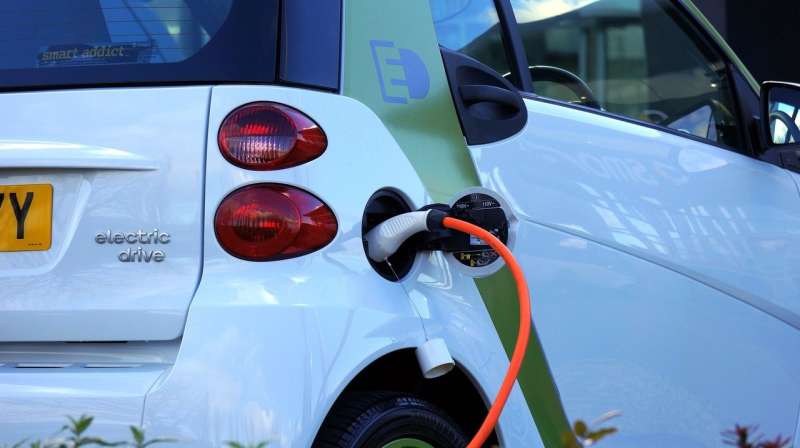This article has been reviewed according to Science X's editorial process and policies. Editors have highlighted the following attributes while ensuring the content's credibility:
fact-checked
peer-reviewed publication
trusted source
proofread
Solid-state batteries could soon make electric cars safer and better

Today's electric cars use large lithium-ion batteries, which work fairly well. They can store a fairly high amount of energy in relation to their weight. They also don't need to be completely discharged each time before being recharged, so you can usually put the car on charge when it suits you without thinking too much about whether you are damaging the battery.
But these batteries still don't have enough energy density for emerging applications and EVs. They are unstable and flammable, so it is perhaps not surprising that the search is on for alternatives.
"Solid-state batteries can be the future for tomorrow's electric cars," says Daniel Rettenwander, a professor at NTNU's Department of Materials Science and Engineering.
Rettenwander is part of a research team studying how solid-state batteries can be charged much faster than is currently possible, and be made safer and easier to recycle. Their research has been published in Nature Communications. The researchers in Norway collaborated with colleagues in Austria, Germany and the U.S..
The findings may be important as part of the work to get more people to use solid-state batteries, perhaps as a technology which at some point will be ready for commercialization.
Advantages of solid state batteries
Solid-state batteries have several advantages compared to lithium-ion batteries. They can have higher voltage and higher energy capacity for energy storage in relation to their weight and volume.
These kinds of batteries are used today in pacemakers and portable electronics, where it is particularly important for the batteries to be small. Small batteries are also easier to make—which is why solid-state batteries are only commercial available at small scale. The production costs for larger batteries would be far too high since their manufacture is expensive.
Solid-state batteries can also be safer than conventional lithium-ion batteries. Among other characteristics, they tolerate much greater temperature fluctuations than lithium-ion batteries. This is especially nice on cold winter mornings in the garage or on long trips.
In addition, solid-state batteries are less flammable than lithium-ion batteries because they do not contain a liquid electrolyte. These electrolytes are charged substances that are used to conduct electricity. As their name suggests, solid-state batteries use solid substances instead of the far more common liquid electrolytes.
Faster to recharge
But solid-state batteries could be faster to charge than they are today. One challenge that needs to be overcome is that it is more difficult to use solids than liquids to transfer electrical charges.
"We have investigated how we can charge solid-state batteries more efficiently at much higher current, which reduces the charging time of any electronic device or EV using these batteries," says Florian Flatscher, a Ph.D. candidate who worked with Rettenwander and Verena Reisecker from Graz University of Technology.
The charging mechanism is very complicated for most of us to understand, but those who already know a bit about this can take a look at the article here. The results from the research can also contribute to solid-state batteries being easier to recycle.
Can be safer
The researchers also know more about why solid-state batteries break down. It goes without saying that this is important.
"Solid state batteries also use lithium. We see that lithium activity can play a critical role when solid-state batteries stop working," says Rettenwander.
This is a completely new insight, and is a step on the way to understanding the underlying mechanisms behind what are called "dendrites." These pose a problem in solid state batteries. In this context, dendrites are special lithium particles that can be formed by corrosion and mechanical stress. These lithium particles can in turn short circuit conductors.
"We now know more about how we can prevent such dendrites from forming. That's a real advantage for safety," says Flatscher.
Solid-state batteries are more expensive than lithium batteries, but this may change when they are mass produced. A number of manufacturers have announced that they are developing cars with solid-state batteries. The first ones may be on the market as early as 2024.
More information: V. Reisecker et al, Effect of pulse-current-based protocols on the lithium dendrite formation and evolution in all-solid-state batteries, Nature Communications (2023). DOI: 10.1038/s41467-023-37476-y

















